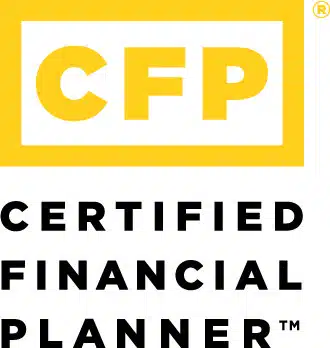Recently, a client told me about a conversation they’d had with a friend. The client’s friend claimed they did not work with a financial advisor because advisors charge high commissions.
This is a misconception that many, many people hold as the truth – and most professionals in the financial industry do very little to clear up the confusion.
When it comes to a CERTIFIED FINANCIAL PLANNER™ vs financial advisor or other industry professional, there are differences you need to understand.
Of course, my client knew how far from the truth their friend was. At Lake Road Advisors, it’s not that we don’t charge high commissions. We don’t charge commissions at all!
But aren’t we financial advisors? We are – and all advisors are not running the same type of business. Here’s what you need to understand when considering hiring a financial professional, including the differences you’ll find between a CERTIFIED FINANCIAL PLANNER™ vs financial advisor.
The Lack of Transparency Leads to Confusion Around Who Gives Financial Advice
This misunderstanding about how businesses charge to deliver financial advice to their clients is part of why many people simply don’t trust the financial industry as a whole. In fact, Financial Advisor Magazine reports that only 23% of investors trust financial advisors.
I get it. I personally know many people who have had bad experiences with pushy salespeople who call themselves financial advisors and sold products for high commissions.
This bothers me as someone with the job title “financial advisor.” The reality is, that’s all the term is: a job title. It does not confer any kind of expertise, knowledge, professionalism, or ethical standard.
Because anyone can use the term, I often refer to myself as a CERTIFIED FINANCIAL PLANNER™ vs financial advisor, because I don’t want to be lumped into that broad category that includes businesses that look nothing like the financial planning practice we run at Lake Road.
The problem starts with transparency. It’s very difficult for you as a client to know precisely who you’re dealing with when someone shows up calling themselves a financial advisor.
CERTIFIED FINANCIAL PLANNER™ vs Financial Advisor: There’s a Difference!
“Financial advisor” is a broad, unregulated term. Again, anyone can call themselves a financial advisor, regardless of background, education, or training.
Someone who is an insurance agent, a stock broker, an investment advisor, or a financial planner can all call themselves a financial advisor — even though, clearly, these professionals all do very different things for the people they work with.
Making the problem even worse is the multitude of titles and designations that financial advisors have. Many of these titles are little more than marketing strategies; they don’t actually indicate relevant training or experience.
You can dive into some of the specific designations that do hold weight here. Generally speaking, you want to look for someone who holds the CFP® credentials.
A CFP® is a CERTIFIED FINANCIAL PLANNER™ accredited and regulated by the CFP® Board. To use these marks, a CERTIFIED FINANCIAL PLANNER™ must undergo rigorous education, training, and experience standards. They must also sit for and pass an intensive board exam and maintain continuing education credits over time.
Perhaps just as important, if not more so, is the fact that a CERTIFIED FINANCIAL PLANNER™ also needs to commit to a code of ethics. As a CFP®, I am legally and ethically bound to act in the best interest of my clients at all times. Our firm upholds the fiduciary standard — no matter what.
You’d think this would be a given for any financial professional, but that’s where the high-charging advisors come into play. Not all financial professionals are required to act in their client’s best interests. Some only need to do what’s “suitable,” meaning it can work for you but it’s not necessarily the best option or solution.
When Working with a CERTIFIED FINANCIAL PLANNER™, You Know What You’re Getting
Remember, anyone — regardless of what they actually do for you — can call themselves a financial advisor. But only certified and credentialed professionals can use the CFP® marks, which is why this is a great designation to look for if what you need is comprehensive financial planning and investment management advice.
If you want to go a step further, look for a CFP® who works within a fee-only firm. When a planner or advisor is “fee-only,” it means they only accept payment for services directly from their clients; they don’t receive commissions or payments from third parties. The only thing they sell is their service, which again, is comprehensive advice (not products).
Working with a CERTIFIED FINANCIAL PLANNER™ vs financial advisor can bring more transparency to the process. You know what you’re getting.
To me, the real value in what we do lies in the relationships we build with clients and the financial planning — not the investment management. We take our time to understand your goals and what’s important to you, and we don’t prescribe before we diagnose.
You may not get that with a salesperson whose top priority is to sell you a product. If you want a financial plan, make sure you go to a financial planner who delivers that advice, rather than recommends products (or specific investments before understanding what you’re trying to achieve!).
Ultimately, I do agree with that friend of my client’s who disliked high-commission advisors. If you are paying over 1% for a financial advisor who talks to you once a year and only about your investment portfolio, then yes, you are overpaying.
But don’t shun all means of receiving financial advice. Instead of not working with anyone, consider working with an actual CERTIFIED FINANCIAL PLANNER™ who serves as your fiduciary to build a plan for not just your investments, but your entire life.
Want to see a quick video on How to Find the Right Planner For You? Click below and watch Episode 3 of “The Build”, our 24 part video planning series that takes you from start to finish in building a financial plan with Lake Road Advisors!




